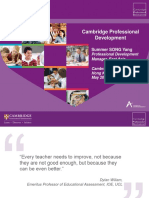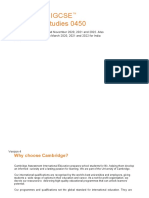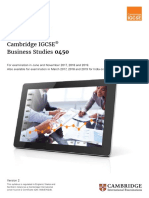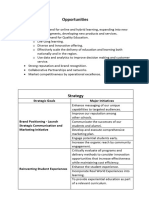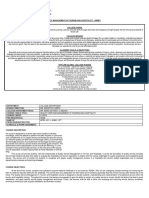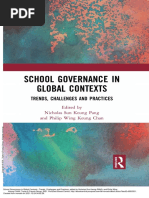Syllabus Cambridge International Certificate Early Years Good Practice 5889 PDF Educational Assessment Mentorship
Syllabus Cambridge International Certificate Early Years Good Practice 5889 PDF Educational Assessment Mentorship
Uploaded by
paulitapesaunaCopyright:
Available Formats
Syllabus Cambridge International Certificate Early Years Good Practice 5889 PDF Educational Assessment Mentorship
Syllabus Cambridge International Certificate Early Years Good Practice 5889 PDF Educational Assessment Mentorship
Uploaded by
paulitapesaunaCopyright
Available Formats
Share this document
Did you find this document useful?
Is this content inappropriate?
Copyright:
Available Formats
Syllabus Cambridge International Certificate Early Years Good Practice 5889 PDF Educational Assessment Mentorship
Syllabus Cambridge International Certificate Early Years Good Practice 5889 PDF Educational Assessment Mentorship
Uploaded by
paulitapesaunaCopyright:
Available Formats
0 calificaciones · 126 vistas · 30 páginas
Syllabus: Cambridge International Certificate Early
Years Good Practice 5889
Cargado por hoxbay999 Título mejorado con IA
cmabridge Descripción completa
Guardar 0% 0% Insertar Compartir Imprimir Reportar
Cambridge Professional Development
Cambridge International Certificate
Syllabus
Cambridge International Certificate
Early Years Good Practice 5889
For examination in 2023 to 2028
PR
CambridgeAssessmentCambridge
InternationalEducation Pathway
Version 1
ANUNCIO Descarga para leer sin publicidad
Desbloquea este documento
Carga un Why
documento choose Cambr
para descargarlo o idge? Continuar de forma gratuita
suscríbete para leerlo y descargarlo.
O
Cambridge Professional Development Qualifications (PDQs) provide a strong framework to support the effective
Desbloquea
continuing professional development esta página después de un anuncio 10
of candidates.
They help candi dates to:
• engage critically with relevant concepts, principles, theories and best practices from around the world
• apply new ideas and approaches in reflective practice in their own teaching and learning context
• formatively evaluate experiences to plan further development
• transform the quality of teaching and school leadership to improve the outcomes of learners.
Cambridge PDQs are designed to be integrated into schools’ professional development planning, activities and
culture. They help schools to improve through cost-effective, sustainable programmes that benefit teachers and
their learners. They demonstrate to parents, the school community and stakeholders that the school values and
nurtures staff development.
The Cambridg
Cambridge e International
Professional Ce rtificateQualifications
Development in Ea rly Years Good provide
(PDQs) Practiceaisstrong
for ca framework
ndidates who want to: the effective
to support
•
continuing
• engageprofessional development
with the principles of candidates.
and concepts of teaching and learning in early years to improve their
•
effectiveness as practitioners
They help candi dates to:
•
• gain the knowledge, skills and understanding to support an inclusive approach to teaching and learning in
engage critically with relevant concepts, principles, theories and best practices from around the world
Why choose Cambr idge?
•
early years
•
apply new ideas and
use opportunities approaches
to try somethinginnew
reflective
in theirpractice
setting in their own teaching and learning context
•
formatively
engage withevaluate experiences
colleagues to improveto professional
plan further development
knowledge and practice
•
transform
develop a the qualityapproach
reflective of teaching anddevelopment
to the school leadership toprofessional
of their improve the practice
outcomes of learners.
• progress their teaching career.
Cambridge PDQs are designed to be integrated into schools’ professional development planning, activities and
culture.
Research They help schools
indicates to improve
that effective through
teacher cost-effective,
professional sustainable programmes that benefit teachers and
development:
their learners. They demonstrate to parents, the school community and stakeholders that the school values and
•
• is integrated
nurtures into the everyday life of the setting and the practitioner
staff development.
• considers practitioners’ prior knowledge and experience
The offers
•
•
Cambridg e International
opportunities Ce rtificate
for reflection andinlearning
Ea rly Years
fromGood Practice is for ca ndidates who want to:
experience
• engage with and
encourages the principles and concepts
supports innovation andof teaching and learning in early years to improve their
collaboration
•
•
effectiveness as practitio
helps practitioners ners their existing knowledge, skills and understanding of teaching and learning
to develop
•
•
gain the knowledge,
enriches skills
practitioners’ and understanding
learning through criticaltoengagement
support an with
inclusive approach
the theories of to teaching and learning in
others
• early years
• is sustained over time and supported by people with expertise.
• use opportunities to try something new in their setting
The engage
Cer tificate
withis colleagues
design ed to
toprovide
improvefor
professional
such professional
knowledge
deveand
lopment.
practice
develop a reflective approach to the development of their professional practice
•
School feedback:
progress ‘Overcareer.
their teaching the three years we have run the PDQ, we have seen how the
•
programme has been a catalyst for exciting conversations about Teaching and Learning across
Research
the school.
• indicates
The PDQ that effective teacher
candidates areprofessional
envoys in development:
their departments for the reflective and rigorous
approach
• that into
is integrated we want to seelife
the everyday in of
allthe
staff, andand
setting that
thecollaboration
practitioner at department level has allowed
the considers
•
benefits of the PDQ to
practitioners’ blossom
prior knowledgebeyond those who have participated in the course. By
and experience
engaging with educational research and theories, and embedding these in their practice, the
• offers opportunities for reflection and learning from experience
PDQ candidates have been role models to their departmental colleagues. In particular, the high-
• encourages and supports innovation and collaboration
quality evidence-based research in the diploma programme has challenged teachers across the
helps practitioners to develop their existing knowledge, skills and understanding of teaching and learning
school to be bold and ambitious as they reflect on their own practice, striving for excellence.’
enriches practitioners’ learning through critical engagement with the theories of others
Feedback from: Bianca Wright, PDQ Programme Leader, Head of Teaching and Learning, Hebron School, Tamil
is sustained
Nadu, South Indiaover time and supported by people with expertise.
The
© Cer tificate
Cambridge is design
University Pressed to provideJanuary
& Assessment for such professional
2022 deve lopment.
Cambridge Assessment International Education is part of Cambridge University Press & Assessment. Cambridge University Press &
Assess ment is a depar tment of the Univers ity of Cambri dge.
Cambridge
School University
feedback: Press & Assessment retains the copyright on all its publications. Registered centres are permitted to copy
‘Over the three years we have run the PDQ, we have seen how the
material from this booklet for their own internal use. However, we cannot give permission to centres to photocopy any material that is
programme
acknowledged to hasa thirdbeen a catalyst
party even for internal for exciting
use within conversations about Teaching and Learning across
a centre.
the school. The PDQ candidates are envoys in their departments for the reflective and rigorous
approach that we want to see in all staff, and that collaboration at department level has allowed
ANUNCIO the benefits of the PDQ to blossom beyond those who have participated in the course.Descarga By para leer sin publicidad
engaging with educational research and theories, and embedding these in their practice, the
PDQ candidates have been role models to their departmental colleagues. In particular, the high-
quality
Feedbackevidence-based research in the diploma programme has challenged teachers across the
from: Bianca Wright, PDQ Programme Leader, Head of Teaching and Learning, Hebron School, Tamil
school to be
Nadu, South bold and ambitious as they reflect on their own practice, striving for excellence.’
India
© Cambridge University Press & Assessment January 2022
Cambridge Assessment International Education is part of Cambridge University Press & Assessment. Cambridge University Press &
Assess ment is a depar tment of the Univers ity of Cambri dge.
Cambridge University Press & Assessment retains the copyright on all its publications. Registered centres are permitted to copy
material from this booklet for their own internal use. However, we cannot give permission to centres to photocopy any material that is
acknowledged to a third party even for internal use within a centre.
Contents
Why choose Cambridge? ...............................................................................................2
1 Introduction ................................................................................................................ 4
Purpose of this document 4
Quality 4
2 The Cambridge teacher ..............................................................................................5
Cambridge Standards for Early Years Practitioners 5
How to use the Standards 5
3 Syllabus Overview .......................................................................................................6
The PDQ Programme Leader 6
The Certificate Syllabus 6
Eligibility 7
Language requirements 7
What is the qualification structure? 8
What does the Certificate involve? 9
How is the Certificate assessed? 10
Evidence requirements 10
Reflective journal 11
4 Certificate in Early Years Good Practice ................................................................12
Introduction to the Certificate 12
Module 1 Exploring child development, learning and teaching in the Early Years 13
Unit 1 Understanding child development 13
Unit 2 Teaching in an effective early years learning environment 15
Unit 3 Facilitating active learning in the early years 17
Assessment criteria 19
5 Support and resources for PDQ programmes ....................................................... 21
What is PDQ Connect? 23
6 Glossary .....................................................................................................................24
ANUNCIO Descarga para leer sin publicidad
Cambridge Professional Development Qualifications – Early Years Good Practice 5889 syllabus for 2023–2028.
1 Introduction
Purpose of this document
This syllabus sets out the details of the Certificate in Early Years Good Practice. This is a Cambridge
Professional Development Qualification (PDQ) offered by Cambridge Assessment International Education.
The syllabus will help Programme Leaders in Cambridge Professional Development Centres understand
the design, structure and requirements of this qualification. It will also help them to guide their candidates
accordingly.
The syllabus focuses on the learning outcomes and related scheme of assessment. For further guidance on
the design principles and features of programmes leading to these qualifications please see the resources for
Cambridge Professional Development Centres.
These are available at www.cambridgeinternational.org/pdq
Cambridge International retains the copyright on all its publications. Registered centres are permitted to
copy material from this booklet for their own internal use. However, we cannot give permission to centres to
photocopy any material that is acknowledged to a third party, even for internal use within a centre.
Quality
Cambridge PDQs are benchmarked to the Framework for Higher Educational Qualifications (FHEQ) for England,
Wales and Northern Ireland. Cambridge PDQ Certificates are benchmarked to FHEQ Level 4 and Diplomas to
FHEQ Level 5.
This means that teachers and leaders achieving a Cambridge PDQ are well prepared for their next step in the
professional development pathway and their Cambridge PDQ has value as they progress to relevant Level 6
and 7 programmes.
School feedback: ‘The PDQ is an excellent way to encourage collaboration among teachers.
From the sharing of experiences in the weekly sessions, to peer observations with colleagues
and mentors, teachers talk to and support each other much more often. The natural outcome of
this is a significant increase in personal reflection of day-to-day teaching practice.’
Feedback from: Erica Davis, Deputy Principal & Programme Leader for the Certificate in Teaching and Learning
Wuhan ULink College of China Optics Valley
Back to contents page www.cambridgeinternational.org/pdq 4
ANUNCIO Descarga para leer sin publicidad
Secretaría de Movilidad
En tu casa te esperan. Te queremos vivo, por Abrir
eso nos comprometemos con tu seguridad vial.
Desbloquea este documento
Cambridge Professional Development Qualifications – Early Years Good Practice 5889 syllabus for 2023–2028.
Carga un documento para descargarlo o Continuar de forma gratuita
suscríbete para leerlo y descargarlo.
O
2 The Cambridge teacher
Desbloquea esta página después de un anuncio 10
Cambridge International programmes and qualifications develop not only subject knowledge and skills but also
attitudes, ways of thinking and behaviours.
There are five Cam bridge teache r attributes. Cam bridge teacher s are:
• confident in teaching their subject and engaging each learner in learning
Cambridge Professional Development Qualifications – Early Years Good Practice 5889 syllabus for 2023–2028.
• responsible for themselves, responsive to and respectful of others
• reflective as learners themselves, developing their practice
• innovative and equipped for new and future challenges
• engaged intellectually, professionally and socially, ready to make a difference.
More information on the Cambridge teacher and Cambridge learner attributes can be found at:
www.cambridgeinternational.org/images/271189-the-cambridge-learner-and-teacher-attributes.pdf
Cambridge International programmes and qualifications develop not only subject knowledge and skills but also
Cambridge Standards for Teachers, School Leaders and Early Years
•
attitudes, ways of thinking and behaviours.
Practitioners
•
There are five Cam bridge teache r attributes. Cam bridge teacher s are:
•
Our Cambridge Standards for Teachers, School Leaders and Early Years Practitioners define what we believe
confident in teaching their subject and engaging each learner in learning
2 The Cambridge teacher
•
to be key characteristics of effective teaching and leadership. They focus on supporting practitioners, and
• responsible
leaders, and they for
offerthemselves, responsive
an opportunity for self to and respectful
evaluation which of others
helps them to understand their professional
reflective
learning and development needs.
as learners themselves, developing their practice
innovative and equipped for new and future challenges
The engaged
Standards a re based on the latest international rese arch into effective teachi ng and school le adership,
intellectually, professionally and socially, ready to make a difference.
taking into account a wide range of international practices and advice from education experts around the world.
More information on the Cambridge teacher and Cambridge learner attributes can be found at:
www.cambridgeinternational.org/images/271189-the-cambridge-learner-and-teacher-attributes.pdf
Cambridge Standards for Early Years Practitioners
The Cambridg e Standards for Earl y Years Practiti oners can be used to:
• evaluate current practice
• help identify, prioritise and plan areas for professional development
Our understand
• Cambridge the teaching
Standards forrequirements for Cambridge
Teachers, School EarlyEarly
Leaders and Years programme
Years in order
Practitioners to achieve
define what wethe
believe
desired
to be outcomes forofyoung
key characteristics children
effective teaching and leadership. They focus on supporting practitioners, and
leaders, and they offer an opportunity for self evaluation which helps them to understand their professional
Cambridge Standards for Teachers, School Leaders and Early Years
learning and development needs.
How to use the Standards
Practitioners
The Standards a re based on the latest international rese arch into effective teachi ng and school le adership,
The Standards
taking c an be
into account usedrange
a wide to evaluate your practic
of international e, yourand
practices teaching
adviceorfrom
youreducation
schoo l leadershi
expertsp around
by asking
thekey
world.
questions and looking for examples from practice. By using our RAG grids you can identify where you are now
and which areas you need to improve. This would be a really useful exercise to undertake while planning a PDQ
•
programme. It could also be used again to evaluate the programme’s impact.
•
You Cambridg
The
•
can download the St andards,
e Standards for Earl yRAG grids
Years andoners
Practiti onli necan
guide
be from:
used to:
evaluate current practice
www.cambridgeinternational.org/support-and-training-for-schools/professional-development/
help identify, prioritise and plan areas for professional development
professional-development-qualifications/school-leader-teacher-standards/
understand the teaching requirements for Cambridge Early Years programme in order to achieve the
Cambridge
desired outcomesStandards for Early Years Practitioners
for young children
Back to contents page www.cambridgeinternational.org/pdq 5
The Standards c an be used to evaluate your practic e, your teaching or your schoo l leadershi p by asking key
ANUNCIO questions and looking for examples from practice. By using our RAG grids you can identify where you are now
Descarga para leer sin publicidad
and which areas you need to improve. This would be a really useful exercise to undertake while planning a PDQ
programme. It could also be used again to evaluate the programme’s impact.
How
You can to use the
download theStStandards
andards, RAG grids and onli ne guide from:
www.cambridgeinternational.org/support-and-training-for-schools/professional-development/
Cambridge Professional Development Qualifications – Early Years Good Practice 5889 syllabus for 2023–2028.
professional-development-qualifications/school-leader-teacher-standards/
Back to contents page www.cambridgeinternational.org/pdq
3 Syllabus Overview 5
The PDQ Programme Leader
Every Cambridge PDQ Centre appoints a Programme Leader who is responsible for designing and managing
the programme. The Programme Leader is pivotal to the quality and success of the Cambridge PDQ
programme.
The role is wide-ranging, from designing and developing the programme to liaising with mentors, school
leadership and Cambridge International. Being an effective Programme Leader is about shaping and
supporting professional learning to have an impact on the quality of practice in schools and early years settings.
Programme Leaders evaluate their professional development learning programme as part of their commitment
to professional development.
We provide a wide range of practical resources, detailed guidance and innovative support so that Programme
Leaders can give their candidates the best possible preparation for Cambridge PDQs.
The Certificate Syllabus
This Certificate is designed to help candidates develop their professional thinking and practice, and enhance
the quality of teaching and learning. It is for practising teachers and practitioners, focusing on the development
of knowledge, skills and understanding in the key aspects of teaching and learning in early years settings. It
helps candidates to explore and apply new ideas in their own context, integrate new approaches in their own
practice, and demonstrate their professional development as reflective practitioners.
Two essential principles underpin the design of the qualification: effective practice and effective professional
development. The programme involves a spiral of professional learning, each stage being a cycle of experiential
learning and reflective practice following on from the previous cycle and leading on to the next. Areas of
learning are revisited systematically within the programme so that the candidate can engage with these in more
depth and detail, and acquire related knowledge and skills.
The spiral of professional learning in a Cambridge PDQ programme depends particularly on three processes:
• observation
• reflection
• learning with and from mentors.
These processes work together. It is crucial that candidates receive feedback to inform their continuous
reflection on their learning experiences. Observation and reflection are much more effective with the support of
a mentor.
The mentor develops a learning relationship with the candidate, supporting them during their work-based
learning to make the most of the learning experience and to achieve the Cambridge qualification. The mentor
understands the essential principles of the Cambridge PDQ, and provides helpful advice to their candidate,
sharing their own experiences and knowledge.
Back to contents page www.cambridgeinternational.org/pdq 6
ANUNCIO Descarga para leer sin publicidad
Cambridge Professional Development Qualifications – Early Years Good Practice 5889 syllabus for 2023–2028.
Syllabus Overview
Eligibility
Candidates must:
• be a full or part-time practitioner employed in an early years setting
• teach in their current institution over a full academic year, for a minimum of 24 weeks and a minimum of six
hours per week
• have the regular support of a mentor who understands the essential principles that underpin this
qualification, and can provide helpful advice and observations
• teach a group with a minimum of six young children
• be responsible for planning, teaching and formatively assessing groups of young children.
Candidates who do not meet the above criteria cannot make an entry for this syllabus. Those candidates
may meet the criteria for syllabus 5880.
School feedback: ‘Having the continued support and guidance of mentors throughout the
PDQ course have been invaluable for both our candidates and the mentors themselves. We
have seen an improvement in reflective practice and an increase in willingness to experiment
with best practices. The candidates find they have a safe space to collaborate, share their
experiences and ask for advice. This has empowered and made them more open to developing
their practice.’
Feedback from: Melissa Alberts, Professional Development Officer, GenEx Institute, Cape Town, South Africa
Language requirements
To take part in the Certificate programme candidates are required to have sufficient competence
in English. All candidates should have English language competence comparable to Level B2 in
the Common European Framework of Reference for Languages (CEFR). This framework
is provided by the Council for Europe. Further details can be found on the Council’s website at
http://coe.int/t/dg4/education/elp-reg/cefr grids EN.asp
We recommend a minimum requirement of 5.5 on the International English Language Testing System.
See www.ielts.org/ for more details.
Back to contents page www.cambridgeinternational.org/pdq 7
ANUNCIO Descarga para leer sin publicidad
Desbloquea este documento
Cambridge Professional Development Qualifications – Early Years Good Practice 5889 syllabus for 2023–2028.
Syllabus Overview
Carga un documento para descargarlo o Continuar de forma gratuita
suscríbete para leerlo y descargarlo.
O
What is the qualification structure?
Desbloquea esta página después de un anuncio 9
Module 1 can be taken on its own as the Certificate. Candidates can then progress to Modules 2 and 3 to
complete the Diploma.
The Diploma c an also be take n as a standalo ne qualification.
Module 1 Module 2 Module 3
Cambridge C
Professional
ertificate Development Qualifications
Diplo–m
Early
a Years Good Practice 5889 syllabus for 2023–2028.
Syllabus Overview
The table be low shows what is involved in e ach module.
Learning hours in preparation 150
Recommended programme 4 months per module
duration
Module 1 can be taken on its own as the Certificate. Candidates can then progress to Modules 2 and 3 to
complete the Diploma.
Assess ment Portfolio of evide nce of practice,
learning and reflection
The Diploma c an also be take n as a standalo ne qualification.
Evidence length 3600 words with work-based records
What is the qualification structure?
Module 1 Module 2 Module 3
Certificate Diploma
The table be low shows what is involved in e ach module.
Learning hours in preparation 150
Recommended programme 4 months per module
duration
Assess ment Portfolio of evide nce of practice,
learning and reflection
Evidence length 3600 words with work-based records
Back to contents page www.cambridgeinternational.org/pdq 8
ANUNCIO Descarga para leer sin publicidad
Desbloquea este documento
Cambridge Professional Development Qualifications – Early Years Good Practice 5889 syllabus for 2023–2028.
Syllabus Overview
Carga un documento para descargarlo o Continuar de forma gratuita
suscríbete para leerlo
Back to contents page y descargarlo. www.cambridgeinternational.org/pdq
8
O
What does the Certificate involve?
Desbloquea esta página después de un anuncio 10
A typical Certific ate programme run by a Cambr idge Professional D evelopment Ce ntre consists of a broad
balance of activities, appropriate to the needs and circumstances of teachers and their schools. The materials
for the guided learning element of this syllabus are provided by Cambridge and the programme is delivered
by the centre’s programme leader and team as a coherent sequence of learning over time, with a variety of
elements.
15 Qualifications
Cambridge Professional Development
0 hour
s – Early Years Good Practice 5889 syllabus for 2023–2028.
Syllabus Overview
id ed learni
Gu
ng
c
50
o hours
l
g
a l
I n
A typical Certific ate programme run byb a ndCambr idge Professional D evelopment Ce ntre consists of a broad
i
50 50
n
r
o
balance of activities, appropriate to theraneeds i
v and circumstances of teachers a and their schools. The materials
i
l
e
for the guided learning element of this syllabus
t d
are provided by Cambridge and the programme is delivered
hours hours
i
v
e a
u d
by the centre’s programme leader and team e learning over time, with a variety of
le asl
&
a coherent sequence sof
a
elements. a
rn b -
What does the Certificate involve? in
g Wo
rk
r
e
r
l
l
I e o
a
n
u l uin
d s i
i
c d h g
Centres must provide at least 50 hourso r ofi guided learning for each module. Candidates should integrate as
a G 0 rg
n
much preparation time as possible intob their day-to-day practice. They should allow time for background
i
n
1 5
reading and discussion with their colleagues,
o d i to enrich their reflective practice.
n
t l
hours a
v
In each unit, candidates engage with the a required
vd learning outcomes through a series of activities closely
eu l e
related to their everyday professional work.e The activities and related reflections produce evidence for
assessment.
se
a -
aa n i
hours
n hours b
The mentor plays a vit al role in suppor ting la candidate.
& o dis
Through d
k cussion and que stioning, mentors
encourage candidates to reflect on their learning r and on what it means for their approaches to teaching. They
g
also help candidates to demonstrate through examples and accounts r of practice that they are:
• acquiring new skills W
• learning how to use their new skills and knowledge
• linking changes in classroom practice to improvements in outcomes for young children.
Centres must provide at least 50 hours of guided learning for each module. Candidates should integrate as
50
much preparation time as possible into their day-to-day practice. They should allow time for background
reading and discussion with their colleagues, to enrich their reflective practice.
In each unit, candidates engage with the required learning outcomes through a series of activities closely
50 50
related to their everyday professional work. The activities and related reflections produce evidence for
assessment.
•
The mentor plays a vit al role in suppor ting a candidate. Through dis cussion and que stioning, mentors
encourage candidates to reflect on their learning and on what it means for their approaches to teaching. They
•
also help candidates to demonstrate through examples and accounts of practice that they are:
•
acquiring new skills
learning how to use their new skills and knowledge
linking changes in classroom practice to improvements in outcomes for young children.
Back to contents page www.cambridgeinternational.org/pdq 9
ANUNCIO Descarga para leer sin publicidad
You might also like
- Als CertificateDocument2 pagesAls CertificateJeferson Sardeng100% (4)
- Sci5 TR IssuuDocument62 pagesSci5 TR IssuuAntonio Alonso73% (11)
- Cambridge Professional Development QualificationsDocument16 pagesCambridge Professional Development Qualificationsnicoler111No ratings yet
- Cambridge Standards For Early Years PractitionersDocument7 pagesCambridge Standards For Early Years Practitionerstkiialabidin. boyolali100% (1)
- OBE Process Training MaterialsDocument87 pagesOBE Process Training MaterialsrimeoznekNo ratings yet
- BMGT 26Document9 pagesBMGT 26Ronaldo VargasNo ratings yet
- Syllabus PDFDocument41 pagesSyllabus PDFShahriar AzgarNo ratings yet
- HRM FileDocument6 pagesHRM FileNajmul HussainNo ratings yet
- Supply Chain QualifyDocument5 pagesSupply Chain QualifyNuman SafiyaNo ratings yet
- JD PS TTC 11.23Document8 pagesJD PS TTC 11.23Olivia GarnerNo ratings yet
- Cameron PotterDocument3 pagesCameron Potterapi-357035408No ratings yet
- Igniting A Standard of ExcellenceDocument6 pagesIgniting A Standard of Excellencephamhuong.mu4949No ratings yet
- Professional Development DocumentDocument28 pagesProfessional Development DocumentDerick B. PicardoNo ratings yet
- Cambridge Teacher Standards: 1 © UCLES April 2019 1Document8 pagesCambridge Teacher Standards: 1 © UCLES April 2019 1jacafyNo ratings yet
- Balancing AACSB and National Accreditation Requirements - PresentationDocument36 pagesBalancing AACSB and National Accreditation Requirements - Presentationricha.jainNo ratings yet
- Inbound 8051193343303488750Document18 pagesInbound 8051193343303488750Jheremy ValmoresNo ratings yet
- Syllabus: Cambridge International Award in Teaching and Learning 6207Document25 pagesSyllabus: Cambridge International Award in Teaching and Learning 6207mohammed sadekNo ratings yet
- 1-CCJ-DEVELOPMENT-PLAN (AutoRecovered)Document33 pages1-CCJ-DEVELOPMENT-PLAN (AutoRecovered)JoseMelarte GoocoJr.No ratings yet
- Cambridge IGCSE Business Studies 0450 (Y20-22 - Sy)Document29 pagesCambridge IGCSE Business Studies 0450 (Y20-22 - Sy)(Pajoh) Sinthavong HaraixayNo ratings yet
- IGCSE Business Studies-2017-2019-SyllabusDocument30 pagesIGCSE Business Studies-2017-2019-Syllabusnmrasa100% (1)
- Sbattrick Resume Weebly July2019Document2 pagesSbattrick Resume Weebly July2019api-467731734No ratings yet
- BB EducationDocument4 pagesBB EducationRodolfo Cortes MadrazoNo ratings yet
- StrategyDocument2 pagesStrategypankaj.maheshwariNo ratings yet
- A Guide For School LeadersDocument28 pagesA Guide For School LeadersIsam Al HassanNo ratings yet
- Role Progression Criteria MeasurementDocument11 pagesRole Progression Criteria MeasurementlisaconnollyNo ratings yet
- EMBA 2023 25 BrochureDocument16 pagesEMBA 2023 25 BrochureHitesh MehraNo ratings yet
- Syllabus: Cambridge International Certificate Early Years Good Practice 5889Document30 pagesSyllabus: Cambridge International Certificate Early Years Good Practice 5889hoxbay999No ratings yet
- Ds Mod1Document97 pagesDs Mod1bhoomibhaskar23No ratings yet
- BMGT23 HumanResourceManagement CourseSyllabus CosaDocument13 pagesBMGT23 HumanResourceManagement CourseSyllabus CosaBIANCA CAMILLE COSANo ratings yet
- Gned 08Document14 pagesGned 08Arya BebeNo ratings yet
- BMGT 26-TQM (Revised)Document11 pagesBMGT 26-TQM (Revised)Jay Montegrande LopezNo ratings yet
- Cavite State University: Carmona Campus Department of Management Course Syllabus Second Semester, AY 2020-2021Document8 pagesCavite State University: Carmona Campus Department of Management Course Syllabus Second Semester, AY 2020-2021axel adayaNo ratings yet
- PWC SDC - Campus Recruitment - PMODocument1 pagePWC SDC - Campus Recruitment - PMOprakhar tripathiNo ratings yet
- Syllabus The Certificate in Teaching and Learning 2023 2028 5881Document29 pagesSyllabus The Certificate in Teaching and Learning 2023 2028 5881Minar PakpahanNo ratings yet
- Cambridge O Level Biology 5090: Why Choose Cambridge International?Document48 pagesCambridge O Level Biology 5090: Why Choose Cambridge International?Junaid AbdullahNo ratings yet
- College of Management and Entrepreneurship: Syllabus Total Quality ManagementDocument7 pagesCollege of Management and Entrepreneurship: Syllabus Total Quality ManagementElsa LozanoNo ratings yet
- Business Plan Preparation Syllabus-1Document9 pagesBusiness Plan Preparation Syllabus-1Llanevie Azel V. Zamora-Niez100% (2)
- Cambridge Teacher StandardsDocument6 pagesCambridge Teacher Standardselmasryjoker74No ratings yet
- Syllabus in QSMTMDocument13 pagesSyllabus in QSMTMApril Joy AlbayNo ratings yet
- BMGT 30 Strategic ManagementDocument15 pagesBMGT 30 Strategic ManagementJonalyn MolinaNo ratings yet
- BMGT28 Income and Taxation Syllabus 2022 23 PDFDocument9 pagesBMGT28 Income and Taxation Syllabus 2022 23 PDFFRANCO, Monique P.No ratings yet
- PGDM Brochure & Flyers at Gibs Bangalore - Top PGDM College in Bangalore - Business Management ProgrammeDocument19 pagesPGDM Brochure & Flyers at Gibs Bangalore - Top PGDM College in Bangalore - Business Management ProgrammePradeep KhadariaNo ratings yet
- Contoh Desain Kurikulum-2Document26 pagesContoh Desain Kurikulum-2Roni Gufroni RidoNo ratings yet
- Gurpreet KaurDocument2 pagesGurpreet KaurAnoop MittalNo ratings yet
- Chowdhury Md. ShihabuzzamanDocument2 pagesChowdhury Md. ShihabuzzamanJack SonNo ratings yet
- Workshop Layout LNG Po Ang I-Print TY-Procedure in Trimming Excess Threads On Casual ApparelDocument41 pagesWorkshop Layout LNG Po Ang I-Print TY-Procedure in Trimming Excess Threads On Casual ApparelGino LacandulaNo ratings yet
- MSC Project Management Course BrochureDocument17 pagesMSC Project Management Course BrochureSardar Usama YousafNo ratings yet
- Educ 80Document8 pagesEduc 80Jonathan GalanNo ratings yet
- MKTG 101 DISTRIBUTION MANAGEMENT SyllabusDocument10 pagesMKTG 101 DISTRIBUTION MANAGEMENT Syllabusruby100% (2)
- PURDUEmaster Instructional TechnologyDocument4 pagesPURDUEmaster Instructional TechnologywinNo ratings yet
- CPSQ For TeachersDocument2 pagesCPSQ For TeachershamidihalimNo ratings yet
- Cambridge School Support v1.17Document22 pagesCambridge School Support v1.17Humaira Kaleem100% (1)
- 1448 Fsqdevelopmentreport v7Document38 pages1448 Fsqdevelopmentreport v7José Luis MartínezNo ratings yet
- AMD E Brochure Next CampusDocument6 pagesAMD E Brochure Next CampusniumahassanhassanNo ratings yet
- Apayao State College Conner, Apayao, Philippines 3807 Course Syllabus IN Course Code & TitleDocument5 pagesApayao State College Conner, Apayao, Philippines 3807 Course Syllabus IN Course Code & TitleGladys Bangalan-BagasolNo ratings yet
- Mba 2023 March1Document12 pagesMba 2023 March1ronit.kanjani2No ratings yet
- Planning Template RevDocument5 pagesPlanning Template RevquattrodNo ratings yet
- XIBMS Brochure 2017 PDFDocument48 pagesXIBMS Brochure 2017 PDFdinesh_haiNo ratings yet
- Journal of Quality Assurance for Higher Education Institutions in Malawi: Book IiFrom EverandJournal of Quality Assurance for Higher Education Institutions in Malawi: Book IiNo ratings yet
- Project Management Skills for Coursework: A Practical Guide to Completing Bgcse Exam CourseworkFrom EverandProject Management Skills for Coursework: A Practical Guide to Completing Bgcse Exam CourseworkNo ratings yet
- Preparing for Accreditation: Of Quality Assurance of Professional Educational ServicesFrom EverandPreparing for Accreditation: Of Quality Assurance of Professional Educational ServicesNo ratings yet
- Erratum To: Scaffolding-How Can Contingency Lead To Successful Learning When Dealing With Errors?Document1 pageErratum To: Scaffolding-How Can Contingency Lead To Successful Learning When Dealing With Errors?GunaOneCoganKruiNo ratings yet
- Upsilon Sigma Alpha Fraternity Inc.Document2 pagesUpsilon Sigma Alpha Fraternity Inc.upsilon sigma alpha100% (1)
- Sakholid Nasution BiahDocument12 pagesSakholid Nasution Biahtyas erisNo ratings yet
- Crystal UrseryDocument2 pagesCrystal Urseryapi-241038805No ratings yet
- Check List - Graduation CertificateDocument23 pagesCheck List - Graduation CertificateSreejith RamachandranNo ratings yet
- Exit Questionnaire FormDocument1 pageExit Questionnaire FormEver Mary Joy EscaleraNo ratings yet
- Guide To: Resume Writing: Careerdevelopmentcenter@newhaven - EduDocument11 pagesGuide To: Resume Writing: Careerdevelopmentcenter@newhaven - EduJohn brylle LlemitNo ratings yet
- Prospectus2022 PDFDocument73 pagesProspectus2022 PDFMuhammad FawadNo ratings yet
- Open Merit 1-500Document15 pagesOpen Merit 1-500meenaakhailNo ratings yet
- Challenges of Practice Teaching Faced by Prospective Teachers A Review of Empirical StudiesDocument7 pagesChallenges of Practice Teaching Faced by Prospective Teachers A Review of Empirical StudiesResearch ParkNo ratings yet
- Newsletter Volume 37, Week 2Document16 pagesNewsletter Volume 37, Week 210gbrowneNo ratings yet
- SOP - Iqra - MBA W Leadership - UWSDocument5 pagesSOP - Iqra - MBA W Leadership - UWSAnumHamaeedNo ratings yet
- RA-035659 - CIVIL ENGINEER - Cebu - 5-2022Document157 pagesRA-035659 - CIVIL ENGINEER - Cebu - 5-2022Ash AlbainNo ratings yet
- Ludwig Wittgenstein - Letters To C. K. Ogden-Routledge (1973)Document106 pagesLudwig Wittgenstein - Letters To C. K. Ogden-Routledge (1973)maikonchaiderNo ratings yet
- UMC Notification June 2022Document3 pagesUMC Notification June 2022Daksh RaoNo ratings yet
- 1 - BW NavIC Technology BrochureDocument2 pages1 - BW NavIC Technology BrochureshivaspyNo ratings yet
- CV - Seminar (12.12.2023)Document6 pagesCV - Seminar (12.12.2023)Ankit AmanNo ratings yet
- Biodata Form 1Document2 pagesBiodata Form 1Maricar GalitNo ratings yet
- 1.1 Pang - Chan - School Governance in Global Contexts - 2022 - Chapter 1Document20 pages1.1 Pang - Chan - School Governance in Global Contexts - 2022 - Chapter 1王晓艳No ratings yet
- The Evaluation of Time Claims in Construction ProjectsDocument407 pagesThe Evaluation of Time Claims in Construction ProjectsmarkNo ratings yet
- TOR and RundownDocument11 pagesTOR and RundownBONJOL KEBONJOLNo ratings yet
- Cluster University Srinagar: As Rccommended by The Unfair-Mcans Committce of The Cluster UniversityDocument4 pagesCluster University Srinagar: As Rccommended by The Unfair-Mcans Committce of The Cluster UniversityIrtiqa ZaidNo ratings yet
- RCDC Schedule Feb 2-3Document3 pagesRCDC Schedule Feb 2-3Shruti ChandraNo ratings yet
- Form PDFDocument4 pagesForm PDFOssama bohamdNo ratings yet
- Section X-ADocument13 pagesSection X-ARam YadavNo ratings yet
- Cambridge IGCSE ™: Chemistry 0620/21Document3 pagesCambridge IGCSE ™: Chemistry 0620/21singhnidhi.dNo ratings yet
- Guidelines For Format of Ph.D. Thesis Submission (W.e.f. 28-12-2018) - 448920Document32 pagesGuidelines For Format of Ph.D. Thesis Submission (W.e.f. 28-12-2018) - 448920Bhumika PatelNo ratings yet
- Himalaya's PublicationDocument220 pagesHimalaya's PublicationShahadath HossenNo ratings yet
- RWS Q4 Module2 Lesson-4-7 Version-4Document85 pagesRWS Q4 Module2 Lesson-4-7 Version-4technoware04No ratings yet












